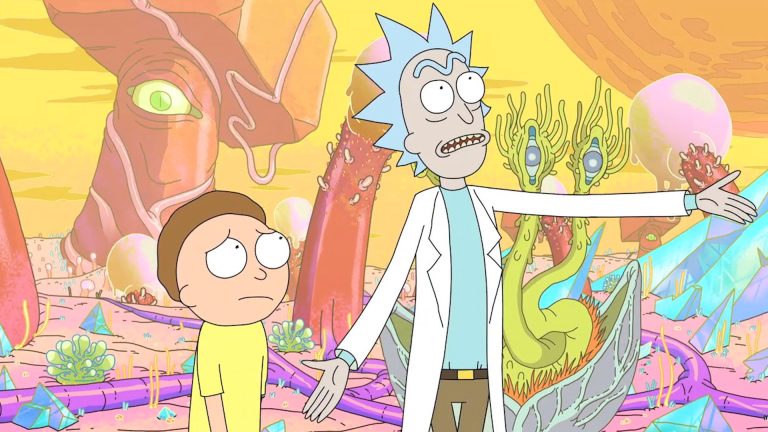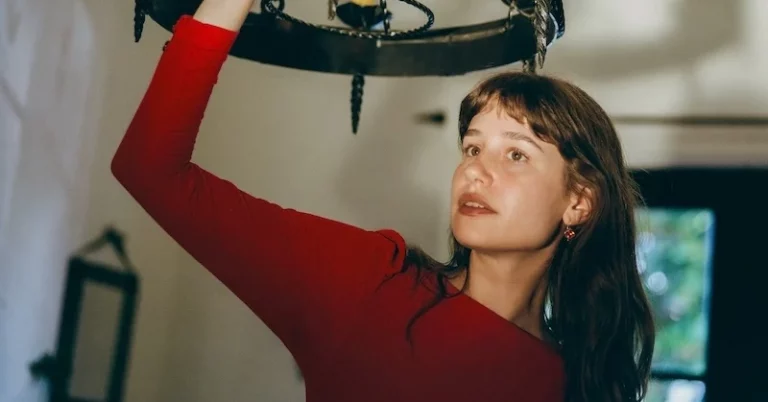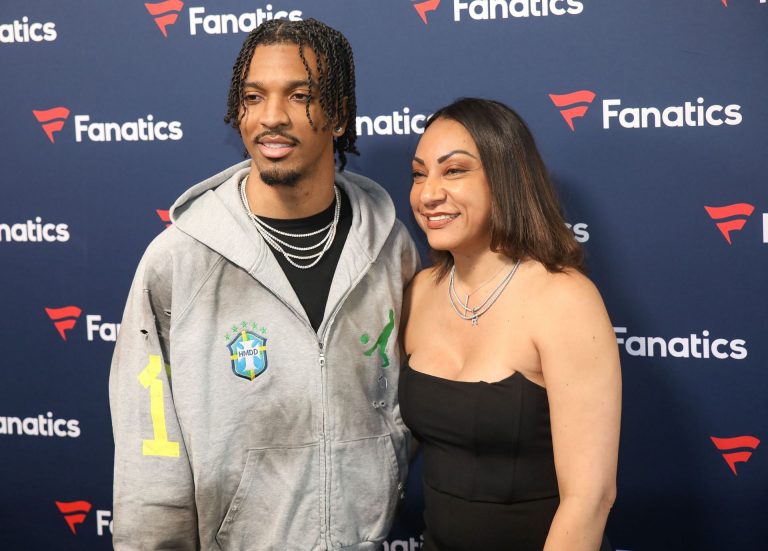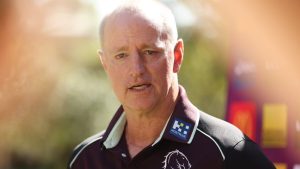In the first hours of 2023, S.G. Goodman found herself explaining the old practice of ‘Planting by the Signs’ to the two people left in her living room after a New Years Eve gathering: her friend and mentor Mike Harmon, and his partner of twenty years, Therese. The Foxfire books, which richly lay out the ancient beliefs, were stacked beside them, and Goodman already knew she wanted to base her next album around what was intrinsically passed down to her through her Kentucky upbringing: the implicit importance of timing everyday acts in accordance with the cycle of the moon. The concept seeps into every corner of her poised, poignant new album, so much so that it is named after it – and even if the listener remains ignorant of it, there are traces of a kind of elemental power in its striking, dreamlike production, courtesy of Goodman and longtime collaborators Drew Vandenberg and Matthew Rowan. It’s a great album to put on at any time of the year, but if the moon is out tonight: be its guest.
We caught up with S.G. Goodman to talk about the Foxfire book series, a Leonard Cohen song, reconciliation, and other inspirations behind Planting by the Signs.
The Foxfire book series
Planting by the signs is a very ancient belief system that, simply put, is just this acknowledgment that the moon affects water. And that anything one would imagine, anything composed of water, because of the moon’s particular phase or star placement, that there would be better times to do things than others, such as plant certain things or build certain things, so that you’ll get different results at different times. For me, what’s weird is – it wasn’t talked about so plainly growing up, but my family actually held a lot of these beliefs. We just didn’t say, like, “These are the ancient beliefs of planting by the signs.” I was really just intrigued by this belief system, the fact that I’ve heard it circling around me all my life, and was really interested in its origins.
After I decided I wanted to write an album around this concept, I wasn’t really writing full songs a lot. I was having a really hard time feeling like I was producing a lot of material at that time. So the way I went about it was I just immersed myself in the subject. And what I found was that when I had read everything I could get my head around or watch this or that or talk to people, when it came time to actually write the material, the imagery and the themes naturally came out in my work. It wasn’t a forced thing. It was a big help, but it also was interesting how I was starting to see my life through this concept.
One of the songs on the album called ‘Michael Told Me’ talks about the death of a friend who died in a tree accident, but also how that relationship was a catalyst to me reconciling a friendship that had suffered a terrible rupture. We had essentially pruned each other out of our lives. In the belief system of planting by the signs, it does talk about pruning and the specific times of the year that you should do that, and if you do it at the right time, then the tree will grow back more full. But if you do it at the wrong time, it could kill the tree completely. I thought that was a beautiful image to put in this song because it, for me, very, much described my experience in a real life relationship.
Living attuned to the lunar phases and seasons
The entire album is about being in tune to signs, instructions, and warnings from nature. I opened the album with ‘Satellite’ because I was interested in what its meaning is for us currently and what it will mean for future generations , when men are kind of obstructing our view of nature. There was a time on Earth when there were definitely no satellites, and now we’re infiltrating all these areas, we’re putting man-made structures on the sides of mountains and our rivers. It’s been happening for years and years. We can go on YouTube and put a creek or a waterfall on, but we don’t have to go out and see it. So what happens when we become more distant from a way that humans have gathered information and direction forever? I feel like that song is trying to raise those questions.
I’m curious, speaking of lunar phases and seasons, if that’s something that you were interested in reflecting in the flow of the album itself.
I did my best. I think there could have been a lot of ways where I could have actually followed the true belief system of planting by the signs, when it came to writing and recording. I could have done it at different times, but that’s over the course of a year, and it would have been pretty difficult to do that. But there have been a lot of odd moments when that has been true. For instance, my record comes out on the solstice. One thing was, I wrote and came off the road in winter of 2023-2024, and that had been the first full winter that I have been in one place in years. Getting to really experience an entire season from one vantage point was so wonderful.
Winter as a farmer’s daughter
Because that’s how I was raised, winter is a true time of rest and solitude. A lot of people hate it because they think it’s too dark. They get depressed. But I think it’s nature’s way of telling you that, “Hey, this is really natural for you to reflect and rest and stay warm and go inside and prepare yourself for the seasons that are approaching.” I think that really got me into a natural rhythm and allowed me to prepare for this album, being able to really stay at home and become centered during one full season.
One of my favorite lines on the album is “marry me in inclement weather” from ‘Nature’s Child’, which speaks to this sentiment.
What’s funny about that song is that that is the only song on the record that is not my work. I love that song too, that’s why it’s on my record. But I have covered that song, a dear friend of mine [Tyler Ladd] wrote it. I probably started singing that song in February 2016. In my opinion, a good song is one that you can remember, and I first heard that one at a bar; it was an open mic night, and he played it. I was blown away. He sang it in a very different way than I do, faster and with a different melody. But the lyrics were just so evocative, and I’ve never forgotten them. It was probably three years after that that he showed back up in my town and on my porch, and I immediately had him come and sit in my living room and play that song and asked him if I could start singing it. When it came time to make this record, I asked permission if I could put it on this record because I just felt like it’s so beautifully tied in our relationship with nature.
Reconciliation
You talked about reconciliation in the context of ‘Michael Told Me’, and I was curious about the stretch of time that it took for the song to fully reveal itself. Do you feel like there was something holding you back from completing the song, or that you were hesitant to do so?
The way I’ve always approached writing, it’s very normal for me to have songs on records that took years and years to write. It goes back to what I said about ‘Nature’s Child’: for me, a good song is one that you remember, so if a song, even a lyric or a melody, sticks around, then I believe that it sticks around for a reason, and I’m just open to it showing back up. I had what I would consider the pre-chorus and chorus of that song for since February 2021, and I had no idea when I first started writing it that it would be actually a story that would go along with a father figure’s death. At the time I started writing it, it was about a rupture I had with a friend and music collaborator. I just believe that a song will tell you what it’s meant to be if you’re willing to stick it out and listen. It’s not that I’m hesitant to finish a song. I just feel like you can’t finish a song, and you have said everything you need to say, until the song itself tells you what it’s supposed to be, and you have to listen to it. You gotta usher it in.
There’s also a thread on the album of reconciliation with love, with your own past – kind of abstract ideas. Do you feel like there’s a part of you that’s more drawn to writing about the falling out than the reconnection, or do you try to maintain a balance?
I would say that if you’re gonna be a songwriter, then you need to tell the truth. That’s all that it amounts to me. I wasn’t trying to balance out my album with what I could reconcile and what I could not. I was just approaching a song and being truthful about what that song was supposed to be. I think if you went at it in a way of trying to completely balance out the message you’re saying, then your work might end up being manipulative.
When it comes to inspiration and writing, I feel like the truth can be more compelling when it hurts, or when gives you hope. That’s the sort of tension I was curious if you’re conscious of.
To be honest with you, I think if you’re going into writing at all thinking in that way, being that aware of your intentions, then you’re probably just getting in the way of the song. It doesn’t matter if you’re writing a song that is hurtful or feels painful to you. It doesn’t mean you have to sing it or release it. You can come to terms with how you feel about it over time, and maybe that’s a reason it can take time to write something. If I would have viewed ‘Michael Told Me’ as a song that I was scared to write or writing the song solely around my bandmate and I’s rupture – if I felt like, “Oh, well, I guess I’m not finishing this song because I’m not willing to say how much this hurts me” – then that song wouldn’t have been ‘Michael Told Me’. It wouldn’t have been about the reconciliation. It would have been written from a place at that particular time where I wouldn’t have spoken or planned to speak to that person for two more years. And it’s not because those feelings weren’t real – I don’t feel like I was holding back by not putting that song out, because that wasn’t what the song was meant to be. It was meant to be about Mike being involved in that friendship and his death being a catalyst to us talking again.
It’s like, with Planting by the Signs, in every single song, there are details that go back to that belief system. Now, if you went as just a listener and tried to point them out to me, if you’re not familiar with that belief system, I guarantee you, you might not find it. What you might find is a song that looks like this is a love song, or this is a song about optimism or whatever. But if I would have gone into this writing process and said, “I’m gonna write a song about how if you nail shingles on a house during the moist part of the moon phase where more water is present, then that shingle is gonna curl” – that would come off as not only insincere, but a bad song because it was forced. You’re trying to write in that way is like a young writer in a college class, trying to make symbolism like William Faulkner. Your subconscious will show those things. But if you go in there trying to make this huge analogy and force it, it’s not gonna end well. [laughs]
Pruning in life for new beginnings
I wanted to focus on the word “pruning,” because it has a specific kind of weight on the album. On ‘Michael Told Me’, you sing of “new pruned hearts,” which I love.
It’s a major theme in Planting by the Signs, but as an actual act, to prune – you have the potential of killing the thing that you’re pruning or giving it new form momentarily for it to grow back even stronger and more healthy. On an album that so heavily focuses on belief systems and putting those belief systems into this modern time, it’s about, what are we going to need to prune from our lives? You can’t be scared to cut things out – people, technology, beliefs to give room for something healthier to grow. And if it wasn’t meant to, then that belief or relationship or habit might be meant to just kinda die.
‘Happens to the Heart’ by Leonard Cohen
Leonard Cohen was one of those writers that just until the very end was really putting out new and amazing songs. But one thing that’s so special about that one is just how the story unfolds, and he takes his time with it. That was really inspirational with certain songs on this album and just maybe my approach in general, which is: it’s okay to unfold a story or a concept slowly and let it build just by what you’re saying. It’s nice to hear a song where you’re not having to put a bunch of bells and whistles on it musically, where just lyrics and a story can be as captivating as a full orchestra.
Mr. Bob’s farm
I worked for him during the pandemic and still will go and spend time there and help him on his farm. That was instrumental because when I came off the road to write this album, I really felt the need to just get back outside and in nature. It’s a place I always return to, and I do find that just with my experience in life, I’ve always really needed to be moving and be active when I’m trying to be in the writing process. I’m not a person who needs to sit still in a room. I need to be seeing things and moving my body and be quiet.
Iranian-American filmmaker Andy Sarjahni’s Wild Hogs and Saffron
He’s an Iranian-American, born in Arkansas to an Iranian father, and grew up in the South. Somebody who was reconciling their beliefs about themselves and their culture and history as both a Southerner, a man from the Ozarks, and also an Iranian at a time when 9/11 had just happened. This film he made is beautiful. It takes place both in Iran and in Arkansas, where he’s hunting wild boar, which is something that takes place in both places. It’s just a beautiful depiction of reconciling complexities in between cultures and how it’s possible. If one were to look at Planting by the Signs as a road map to show someone that over centuries beliefs have evolved and we’ve taken those beliefs and shoved them into tighter boxes, there’s a lot to talk about around those things.
More books: The Dollmaker by Harriette Simpson Arnow, Tell Me How Long the Train’s Been Gone by James Baldwin, and The Wild Edge of Sorrow by Francis Weller
I read so much while I was at home, and those were three very special ones. James Baldwin, Tell Me How Long the Train’s Been Gone – just master of the sentence. One major distinction of southern writing is really a sense of place, and Baldwin is typically writing out of Harlem, but captures a sense of place as well or better than any southern writer. His traditionalist style in writing and remarkable sentence structure was just a calm for the heart. Harriet Simpson Arnaud was a Kentucky writer that I’d never heard of. That book had a lot of accolades, and it is long and a tragedy and absolutely beautiful. Something that I experienced when I read that book was that I genuinely missed the characters when I finished it. I had a heartache about no longer getting to spend time with them, and I think that’s what someone should strive for when they’re writing about anything.
Many songs on this album were written in a time of grief or exploring grief or just deep in that, and The Wild Edge of Sorrow, was a book about grief rituals and about honoring grief. It’s so wild – my dog of thirteen years died two weeks before Mike did. And with the intensity of my touring schedule, I wasn’t able to process that while on the road for almost a year. So that book really helped me understand what it was to honor a season of grief, and I deeply recommend it.
This interview has been edited and condensed for clarity and length.
S.G. Goodman’s Planting by the Signs is out now via Slough Water Records/Thirty Tigers.








